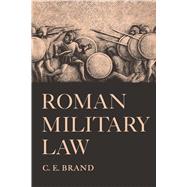- ISBN: 9780292742246 | 029274224X
- Cover: Paperback
- Copyright: 11/15/2011
Rome was the law-giver for much of the modern world. She was also the greatest military power of antiquity, operating her military organization with remarkable efficiency and effectiveness throughout most of the then-known world. In view of the importance of both the legal and military aspects of the Roman Empire, an account of their combination in a system of disciplinary control for the Roman armies is of considerable significance to historians in both fields--and, in fact, to scholars in general. In Roman Military Law,C. E. Brand describes this system of control. Since a characterization of such a system can be made most meaningful only against a background of Roman constitutional government and in the light of ideologies current at the time, Brand follows his initial "Note on Sources" with a sketch of the contemporary Roman scene. This first section includes a discussion of the Roman constitution and an examination ofRoman criminal law. The history of Rome, as a republic, principate, and empire, extended over a period of a thousand years, so any attempt to represent a generalized picture must be essentially a matter of extraction and condensation from the voluminous literature of the whole era. Nevertheless, from the fantastic evolution that is the history of Rome, Brand has been able to construct a more or less static historical mosaic that may be considered typically"Roman." This comes into sharpest focus during the period of the PunicWars, when the city and its people were most intensely Roman. The picture of the Roman armies is set into this basic framework, in chapters dealing with military organization, disciplinary organization, religion and discipline, and offenses and punishments. The final section of the book considers briefly the vast changes in Romaninstitutions that came about under the armies of the Empire, and then concludes with the Latin text and an English translation of the only knowncode of Roman military justice, promulgated sometime during the laterEmpire, preserved in Byzantine literature, and handed down to medieval times in Latin translations of Byzantine Greek law, which it has heretofore been confused.






